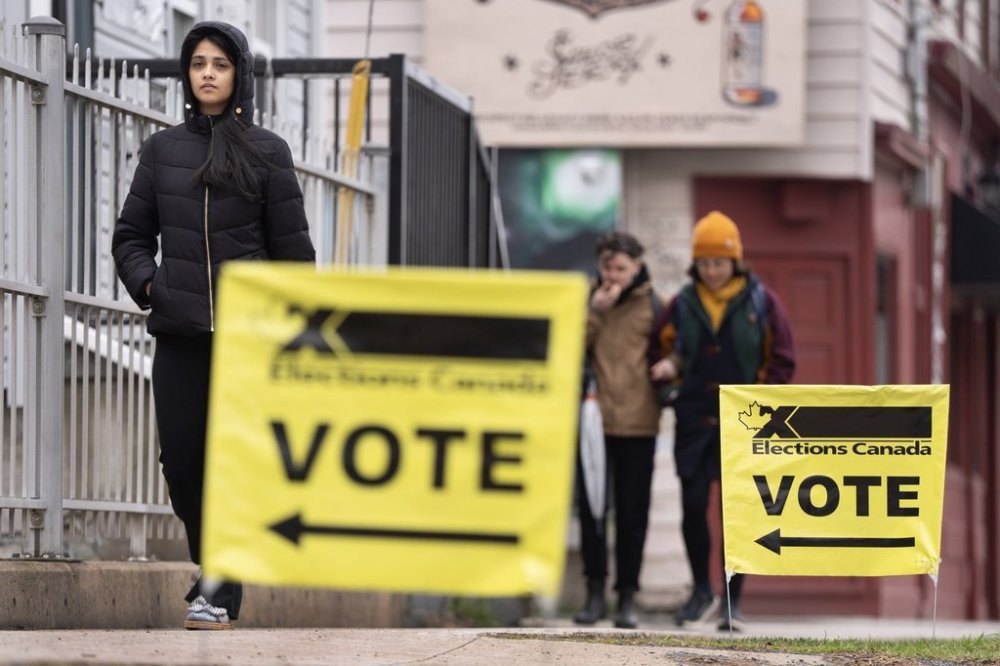Elections Canada to launch review following issues with special ballots
Advertisement
Read this article for free:
or
Already have an account? Log in here »
To continue reading, please subscribe:
Monthly Digital Subscription
$0 for the first 4 weeks*
- Enjoy unlimited reading on winnipegfreepress.com
- Read the E-Edition, our digital replica newspaper
- Access News Break, our award-winning app
- Play interactive puzzles
*No charge for 4 weeks then price increases to the regular rate of $19.95 plus GST every four weeks. Offer available to new and qualified returning subscribers only. Cancel any time.
Monthly Digital Subscription
$4.99/week*
- Enjoy unlimited reading on winnipegfreepress.com
- Read the E-Edition, our digital replica newspaper
- Access News Break, our award-winning app
- Play interactive puzzles
*Billed as $19.95 plus GST every four weeks. Cancel any time.
To continue reading, please subscribe:
Add Free Press access to your Brandon Sun subscription for only an additional
$1 for the first 4 weeks*
*Your next subscription payment will increase by $1.00 and you will be charged $16.99 plus GST for four weeks. After four weeks, your payment will increase to $23.99 plus GST every four weeks.
Read unlimited articles for free today:
or
Already have an account? Log in here »
OTTAWA – Elections Canada is launching a probe into problems with special ballots in the last federal election.
“We really have to look at the controls in place to make sure that they are sufficient” and make improvements where possible, chief electoral officer Stéphane Perrault told reporters at a news conference on Parliament Hill on Monday.
Plans for the review were outlined Monday in the agency’s report on the 45th general election held on April 28. The report promises a “comprehensive review” that will examine training, control mechanisms and processes.
It cites three cases where hundreds of special ballots were handled improperly and left out of the official count. It also points to one riding where the outcome was decided by a single vote and where some special ballots had incorrect postal codes.
“We saw things that we hadn’t seen before, errors that we hadn’t seen before with special ballots,” Perrault said.
In one case cited by Elections Canada, more than 800 special ballots were mistakenly kept at the office of a returning officer in B.C. The ballots were from 74 electoral districts across the country; Elections Canada has said the outcome wouldn’t have been affected in any of those ridings.
Packages of 235 and 232 local special ballots were also found in Nova Scotia and Ontario, respectively, when the local Elections Canada offices were closed following the validation of results. The report noted the candidates in those ridings won by thousands of votes.
But in the riding of Terrebonne in Quebec — where Liberal Tatiana Auguste won by a single vote after a recount — the Bloc Québécois is challenging the result before the Superior Court of Québec.
The Elections Canada report noted the Bloc’s Terrebonne candidate Nathalie Sinclair-Desgagné is arguing “an irregularity had prevented an elector from voting by special ballot, which had affected the results of the election.”
The report said some of the special ballots cast in Terrebonne had the wrong postal codes. Of the 115 special ballots cast, it said, 85 were returned on time and counted, five were received late, sixteen were not returned, and nine voters who requested a special ballot ending up voting in person.
Perrault told reporters it’s not possible to link individual errors to what he said was a higher level of pressure on returning officers.
“But I have no doubt that the overall pressure to deliver a wider range of services in an effectively … shorter period of time increases the risk of errors,” he said.
Perrault said elections are changing, with more voters choosing to vote early. He added it’s also becoming more difficult to find polling locations and to finalize those leases.
“All this puts more pressure on returning officers who already have to deliver an increasing number of services,” he said.

Perrault said special ballots make voting more accessible for voters who might otherwise struggle to cast a ballot — people in remote northern work camps, for example, or people displaced by natural disasters. He said special ballots are “here to stay.”
“But this process is manual and more complex to administer for returning officers,” he added.
Perrault said he expects the review to be finished in the fall and “to implement or begin implementing changes as quickly as possible with a view to preparing for the next election.”
The report also said Elections Canada would review what happened in Nunavik, when two communities found themselves unable to vote and seven “were limited by severally and unexpectedly reduced service hours at polling places.”
It said those problems were “unacceptable” and promised to review the incident and make its conclusions public.
Perrault travelled to Nunavik last week, where he apologized in person for the problems which occurred there.
Removing barriers to voting for First Nations, Inuit and Métis communities was one of four priorities identified by Elections Canada for this spring’s election.
This report by The Canadian Press was first published Sept. 15, 2025.









